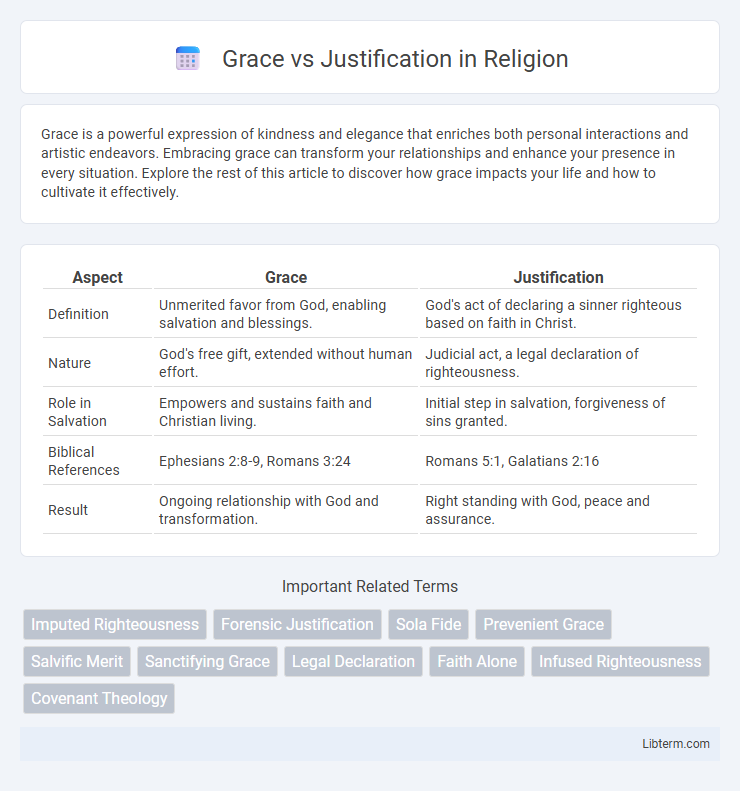Grace is a powerful expression of kindness and elegance that enriches both personal interactions and artistic endeavors. Embracing grace can transform your relationships and enhance your presence in every situation. Explore the rest of this article to discover how grace impacts your life and how to cultivate it effectively.
Table of Comparison
| Aspect | Grace | Justification |
|---|---|---|
| Definition | Unmerited favor from God, enabling salvation and blessings. | God's act of declaring a sinner righteous based on faith in Christ. |
| Nature | God's free gift, extended without human effort. | Judicial act, a legal declaration of righteousness. |
| Role in Salvation | Empowers and sustains faith and Christian living. | Initial step in salvation, forgiveness of sins granted. |
| Biblical References | Ephesians 2:8-9, Romans 3:24 | Romans 5:1, Galatians 2:16 |
| Result | Ongoing relationship with God and transformation. | Right standing with God, peace and assurance. |
Understanding Grace: A Foundational Concept
Grace represents unmerited divine favor bestowed upon believers, foundational to Christian faith and distinct from justification, which is the declaration of righteousness by God. Understanding grace involves recognizing it as an ongoing gift that empowers spiritual growth and sanctification beyond the initial act of justification. This concept underscores salvation as a continuous relationship rather than a one-time legal acquittal.
Defining Justification in Theology
Justification in theology refers to the divine act by which God declares a sinner righteous through faith in Jesus Christ, separating it from human works or merit. It is a legal declaration restoring the sinner's standing before God, emphasizing grace as the unmerited favor underpinning this transformation. This doctrine highlights the pivotal role of grace in enabling justification, ensuring salvation is a gift rather than a reward for human effort.
Grace and Justification: Key Differences
Grace is the unmerited favor from God that initiates salvation, offering forgiveness and renewal without human effort. Justification is the legal declaration by God that a person is righteous based on faith in Jesus Christ, resulting from grace but distinct as a judicial act. The key difference lies in grace being the source of salvation's gift, while justification is the divine verdict that restores the believer's right standing before God.
Biblical References to Grace and Justification
Romans 3:24 emphasizes that all believers receive justification freely by God's grace through the redemption in Christ Jesus. Ephesians 2:8 highlights salvation as a gift of grace, not by works, ensuring no one can boast in their own efforts. Galatians 2:16 states that individuals are justified by faith in Jesus Christ, not by adhering to the law, underscoring the foundational role of grace in justification.
The Role of Faith in Grace and Justification
Faith serves as the essential conduit through which grace is received and justification is applied in Christian theology. Grace, understood as the unmerited favor of God, cannot be earned but is accessed through faith, which acts as the believer's trust and confidence in God's promise of salvation. Justification, the act of being declared righteous before God, is actualized when faith unites the individual with Christ's redemptive work, making faith the pivotal element in experiencing both grace and justification.
Grace: Unmerited Favor or Divine Assistance?
Grace is best understood as unmerited favor, a divine gift given without regard to human merit or works, emphasizing God's unconditional love and mercy. This concept highlights grace as a supernatural assistance that empowers believers to live in accordance with God's will, transcending human limitations and sinfulness. Unlike justification, which is a legal declaration of righteousness, grace represents the ongoing divine presence and strength enabling spiritual growth and transformation.
How Justification Impacts Salvation
Justification, as a legal declaration by God, directly impacts salvation by granting believers righteousness, which removes the guilt of sin and restores their standing before God. This divine act ensures that salvation is not earned through works but received by faith, emphasizing God's grace as the foundation of redemption. The transformative effect of justification secures eternal life, highlighting its central role in Christian soteriology.
Historical Perspectives on Grace and Justification
Historical perspectives on grace and justification vary significantly between Catholic and Protestant traditions, with the Catholic Church emphasizing justification as a process involving grace through both faith and works. The Protestant Reformation, led by figures such as Martin Luther, championed justification by faith alone (sola fide), asserting that grace is a free gift from God that cannot be earned. Early Church Fathers like Augustine influenced these debates by underscoring the transformative power of divine grace in the process of justification.
Grace and Justification in Christian Living
Grace in Christian living refers to the unmerited favor and love bestowed by God, empowering believers to live righteous lives. Justification is the legal declaration by God that a person is righteous through faith in Jesus Christ, marking the beginning of a transformed life. Together, grace sustains the believer's sanctification while justification secures their righteous standing before God.
Contemporary Debates on Grace vs Justification
Contemporary debates on grace versus justification emphasize the nuanced distinctions between divine favor and the process of being declared righteous in Christian theology. Scholars explore how grace serves as the unmerited gift enabling salvation, while justification involves the legal declaration of righteousness through faith. These discussions often highlight tensions between Protestant and Catholic interpretations, especially regarding the role of works and faith in achieving justification.
Grace Infographic

 libterm.com
libterm.com